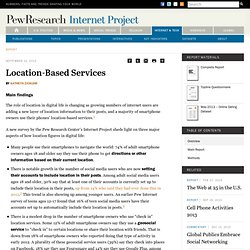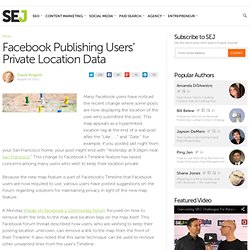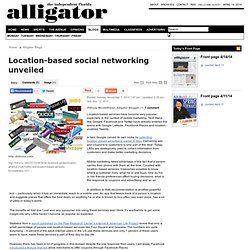

FB geolocation. Location-Based Services. By Kathryn Zickuhr Main findings The role of location in digital life is changing as growing numbers of internet users are adding a new layer of location information to their posts, and a majority of smartphone owners use their phones’ location-based services.

A new survey by the Pew Research Center’s Internet Project sheds light on three major aspects of how location figures in digital life: Many people use their smartphones to navigate the world: 74% of adult smartphone owners ages 18 and older say they use their phone to get directions or other information based on their current location.There is notable growth in the number of social media users who are now setting their accounts to include location in their posts. Among adult social media users ages 18 and older, 30% say that at least one of their accounts is currently set up to include their location in their posts, up from 14% who said they had ever done this in 2011. About this survey. Facebook Publishing Users’ Private Location Data. Many Facebook users have noticed the recent change where some posts are now displaying the location of the user who submitted the post.

This map appears as a hyperlinked location tag at the end of a wall post after the “Like . . .” and “Date.” For example, if you posted last night from your San Francisco home, your post might end with “Yesterday at 9:18pm near San Francisco.” This change to Facebook’s Timeline feature has raised concerns among many users who wish to keep their location private. Because the new map feature is part of Facebook’s Timeline that Facebook users are now required to use, various users have posted suggestions on the forum regarding solutions for maintaining privacy in light of the new map feature.
A Monday thread on Facebook’s Community Forum focused on how to remove both the links to the map and location tags on the map itself.
Geolocation and Privacy: Part I. Location Privacy: Privacy, Efficiency and Recourse through a Prohibitive Contract (Croft & Olivier) EU to get tough on geolocation data privacy. Police maping suspect mvts. ID Codes in Apps. Windows Phones collect location data. Google Android collect location. Mob phone users wary abt privacy. Location-based social networking unveiled - The Independent Florida Alligator: Social Networking. Location-based services have become very popular, especially in the context of mobile marketing.

Tech titans like Google, Facebook and Twitter have already entered the arena with Google Latitude, Facebook Places and location-enabled Tweets. In fact, Google carved its own niche by patenting location-based advertising earlier in May. Delivering ads and coupons to customers is only part of the deal. Today, LBSs are strategically used to collect information from customers and make better marketing decisions.
Mobile marketing takes advantage of the fact that a person carries their phone with them all the time. In addition to that, recommendation is another powerful tool – particularly when it has an immediate reach to a mobile user. The benefits all told don’t just woo any consumer into using these services and I think it’s worthwhile to get some insight into why LBSs haven’t become as popular as expected.